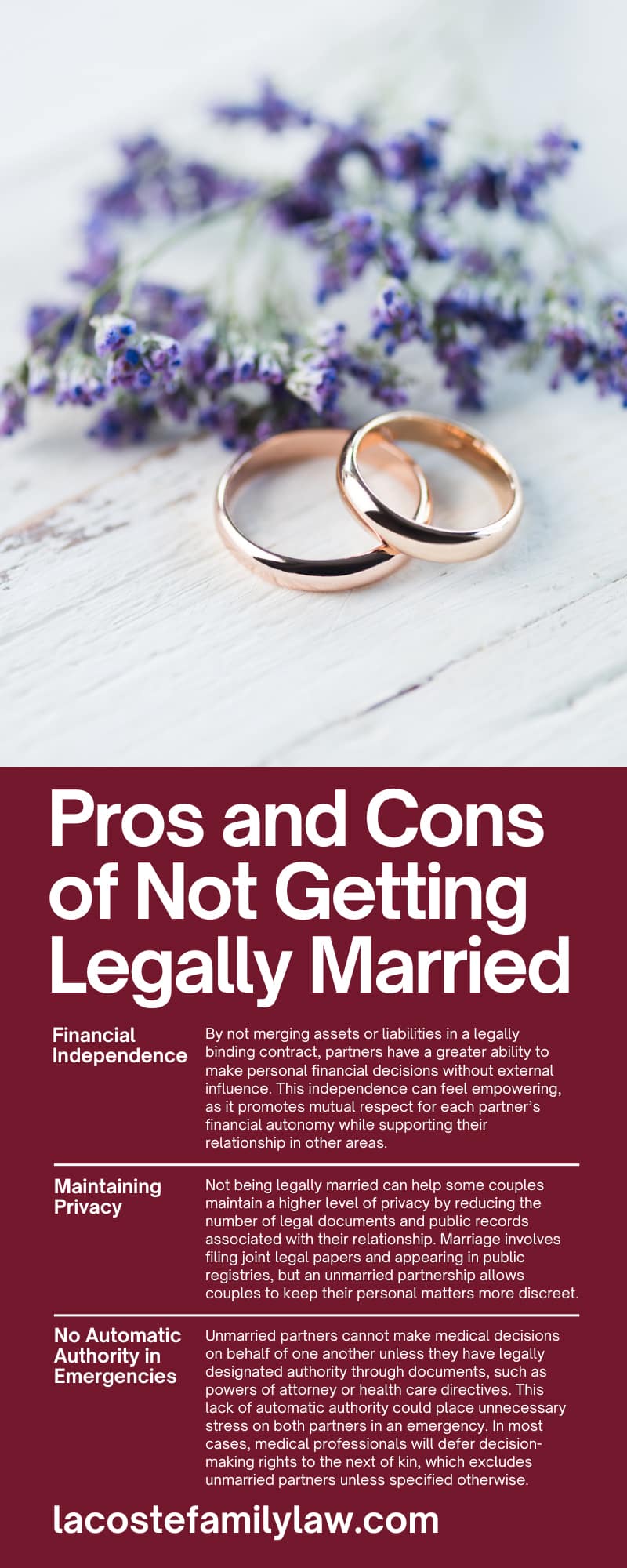
24 Feb 4 Pros and Cons of Not Getting Legally Married
Deciding whether to get legally married is a deeply personal choice that many couples face. While marriage is a long-standing tradition of unity, many couples today stay unmarried for various reasons. Both options present distinctive benefits and challenges that can affect a couple’s personal, emotional, legal, and financial lives.
If you and your partner are at a stage in your relationship where you are thinking about marriage, compare the pros and cons of not getting legally married to the advantages and disadvantages of tying the knot. Weighing your choices can help you make a decision for your shared future that aligns with your goals and values.
The Pros of Not Getting Legally Married
Choosing not to wed allows couples to approach their relationships with a unique focus on individuality and mutual agreement. For many, this provides an appealing sense of freedom.
Financial Independence
Remaining unmarried allows each partner to maintain control over their individual finances. This arrangement is less restrictive for couples who prefer to operate independently and avoids legally combining financial obligations.
By not merging assets or liabilities in a legally binding contract, partners have a greater ability to make personal financial decisions without external influence. This independence can feel empowering, as it promotes mutual respect for each partner’s financial autonomy while supporting their relationship in other areas.
Defining the Relationship on Their Own Terms
Not every couple feels they must have the legal representation of marriage to be official. Rather than adhering to legal standards, many partners find greater satisfaction in defining their commitment to personal, cultural, and spiritual beliefs.
Staying unmarried allows couples to create rules and expectations that align uniquely with their values. Such an approach can strengthen the emotional foundation of the relationship, as it concentrates on maintaining the bond without external pressures. The flexibility to define the parameters of a relationship fosters a sense of authenticity and mutual understanding within the relationship.
Maintaining Privacy
Not being legally married can help some couples maintain a higher level of privacy by reducing the number of legal documents and public records associated with their relationship. Marriage involves filing joint legal papers and appearing in public registries, but an unmarried partnership allows couples to keep their personal matters more discreet.
This can appeal to people who value a low-profile lifestyle or want to shield their relationship from public scrutiny. By avoiding the formalities of marriage, couples can control how much information they share or document about their relationship, fostering an environment of confidentiality and personal discretion.
Avoiding Legal Complications
In the event of an unfortunate breakup, foregoing legal marriage would negate many of the legal challenges associated with divorce. Under most circumstances, unmarried couples who decide to separate do not need to go through formal legal procedures to divide assets, make financial arrangements, or finalize custody agreements unless necessary by choice or law.
If you are unsure of the legal responsibilities you and your partner have as an unmarried couple or a common law partnership, consult a lawyer for help identifying legal gray areas. For example, some unmarried couples in Washington State may receive lawful recognition as a committed intimate relationship (CIR) if they meet the qualifications. The common law marriage legal team at LaCoste Family Law in Washington can help unmarried partners understand the CIR requirements and their legal rights and responsibilities.
The Cons of Not Getting Legally Married
While avoiding legal marriage may work positively in several ways, unmarried couples face certain challenges. These hurdles often revolve around legal protections, societal perceptions, and potential obstacles in times of distress.
Lack of Legal Protection and Benefits
One significant drawback of not entering a legal marriage is the absence of most legal protections granted to married couples. Married partners enjoy inheritance rights, joint tax filings, and access to spousal support laws upon separation.
Unmarried partners do not automatically qualify for these rights, so taking additional steps is necessary to secure similar protections. For example, unmarried couples may need to set up legal documents, such as living wills, powers of attorney, or cohabitation agreements, to address inheritance or financial matters.
While these steps are possible, they require effort, planning, and legal assistance to establish agreements that closely replicate what a legal marriage guarantees. Without these arrangements, partners risk navigating financial and legal challenges without the safety net marriage provides.
No Automatic Authority in Emergencies
Unmarried partners cannot make medical decisions on behalf of one another unless they have legally designated authority through documents, such as powers of attorney or health care directives. This lack of automatic authority could place unnecessary stress on both partners in an emergency. In most cases, medical professionals will defer decision-making rights to the next of kin, which excludes unmarried partners unless specified otherwise.
Limited Social Recognition and Support
Despite evolving societal attitudes toward relationships that do not involve legal marriage, some couples still encounter judgment or misunderstanding from family members and peers. This lack of recognition may stem from traditional ideologies that view marriage as the ultimate commitment between two people. As a result, unmarried partners might face questions about their intentions or the legitimacy of their relationships.
Such perceptions may extend into professional or social circles, where certain institutions or individuals might prioritize married couples in benefits or decision-making processes. Not all unmarried couples encounter these challenges, but it is an element to consider, particularly for those who treasure social validation in their relationships.
Complex Parental Rights and Responsibilities
The legal aspects of parental rights and responsibilities can be more challenging for unmarried couples with children. Married partners share automatic rights as legal parents of their children, but unmarried partners may have to take additional steps to secure parental recognition. Without a legal marital framework, it can be difficult to do the following:
- Establish parentage
- Outline custody or visitation rights
- Create a child support agreement
For families residing in Washington State, LaCoste Family Law legal team advocate for the rights of unmarried parents and have experience defending unmarried fathers’ rights. Our family law team has the legal resources and knowledge of how legal procedures are the same and different for unmarried and married parents, helping them represent you and protect your interests. Understanding such legal nuances is key to ensuring the well-being of the children and the parents’ partnership.
Ultimately, deciding to marry or remain unmarried depends on many factors that affect every couple differently. While remaining unmarried provides flexibility and independence, it also presents legal challenges that partners must consider. Couples can chart a path that aligns with their shared goals, priorities, and values by examining the pros and cons of not getting legally married.


